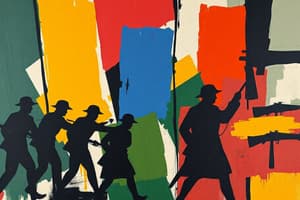Podcast
Questions and Answers
What was the primary objective of Pierre Trudeau's government with regards to the Canadian Constitution?
What was the primary objective of Pierre Trudeau's government with regards to the Canadian Constitution?
- To establish a republic
- To abolish the monarchy
- To adopt the American Constitution
- To repatriate the Constitution from British control (correct)
The FLQ Crisis led to the immediate separation of Quebec from Canada.
The FLQ Crisis led to the immediate separation of Quebec from Canada.
False (B)
What was the name of the series of hockey games between Canada and Russia in the 1970s?
What was the name of the series of hockey games between Canada and Russia in the 1970s?
Canada-Russia hockey series
The Charter of Rights and Freedoms was introduced by Prime Minister _______________________.
The Charter of Rights and Freedoms was introduced by Prime Minister _______________________.
Match the following Prime Ministers with their notable policies or events:
Match the following Prime Ministers with their notable policies or events:
What was the primary cause of the division within the Conservative party after Brian Mulroney?
What was the primary cause of the division within the Conservative party after Brian Mulroney?
Who is considered one of the founding fathers of Canada?
Who is considered one of the founding fathers of Canada?
The Great War did not have a significant impact on Canada.
The Great War did not have a significant impact on Canada.
What were the main causes of World War I?
What were the main causes of World War I?
The _______________ was established in the aftermath of World War II to promote international cooperation and prevent future wars.
The _______________ was established in the aftermath of World War II to promote international cooperation and prevent future wars.
Match the following leaders with their respective countries during World War II:
Match the following leaders with their respective countries during World War II:
What was the main reason for the establishment of the Iron Curtain?
What was the main reason for the establishment of the Iron Curtain?
The Korean War was a significant conflict for Canada.
The Korean War was a significant conflict for Canada.
What were some of the significant changes that occurred in Canada during the post-war years?
What were some of the significant changes that occurred in Canada during the post-war years?
Flashcards are hidden until you start studying
Study Notes
Unit One: A Country is Formed
- Founding fathers of Canada: unknown, but key figures include John A. MacDonald and Wilfrid Laurier
- Dates of founding: unknown, but key events include the formation of provinces
- Original provinces: unknown, but key provinces included Ontario, Quebec, Nova Scotia, and New Brunswick
- John A. MacDonald's successes: became first Prime Minister of Canada, united provinces
- John A. MacDonald's challenges: faced opposition from Wilfrid Laurier
- Wilfrid Laurier's successes: became Prime Minister of Canada, promoted national unity
- Wilfrid Laurier's challenges: faced opposition from John A. MacDonald
- Challenges faced by Indigenous people: loss of land, cultural suppression
Unit Two: Canada Grows Up
- Causes of WWI: complex, but included imperialism, nationalism, militarism
- Two sides of WWI: Allied Powers (France, Britain, Russia) and Central Powers (Germany, Austria-Hungary)
- Canadian contributions in WWI: fought alongside Britain, contributed troops
- Robert Borden's leadership: led Canada through WWI, introduced conscription
- Effect of WWI on Canada: increased nationalism, contributed to growth of Canadian identity
Unit Three: Canada in the Interwar Years
- Economic swings in the 1920s and 30s: prosperity in 20s, depression in 30s
- Reasons for economic swings: global events, overproduction, protectionism
- Results of economic swings: high unemployment, poverty
- Changes to Canada's Foreign Policy: became more independent from Britain
- New political parties: Communist Party, Social Credit Party
- Attempts to solve economic crisis: government intervention, public works projects
Unit Four: Canada and World War Two
- Establishment of dictatorships: Russia (Stalin), Italy (Mussolini), Germany (Hitler)
- Steps to war: appeasement, aggression, invasion of Poland
- Canadian contributions to WWII: fought alongside Allies, contributed troops
- Effect of WWII on Canada: increased nationalism, contributed to growth of Canadian identity
- The Holocaust: genocide of Jews and other minorities by Nazi Germany
- Significance of D-Day: turning point in WWII, Allied victory
Unit Five: The Post-War Years (1945-1982)
- Changes in Canada: increased immigration, suburbanization, cultural changes
- Post-WWII prosperity: economic boom, increase in standard of living
- Iron Curtain: division of Europe into Eastern and Western blocs
- Factors leading to Iron Curtain: fear of communism, Soviet Union's actions
- United Nations: international organization promoting peace and cooperation
- NATO vs. Warsaw Pact: military alliances during the Cold War
- Korean War: conflict between North and South Korea, Canada contributed troops
- Diefenbaker and Pearson's visions for Canada: differed on issues like foreign policy
- Quiet Revolution in Quebec: modernization and secularization of Quebec
- Trudeau's vision for Canada: bilingualism, multiculturalism
- FLQ Crisis: terrorist crisis in Quebec, challenged Trudeau's leadership
- Economic challenges facing Canada: high inflation, high unemployment
- Trudeau's alienation of western Canadians: National Energy Program
Unit Six: Modern Canada (1982-2022)
- Pierre Trudeau's worldview: anti-communist, promoted Canadian independence
- Repatriation of the constitution: brought constitution under Canadian control
- Charter of Rights and Freedoms: enshrined individual rights in law
- Pierre Trudeau's legacy: promoted Canadian unity, bilingualism
- Brian Mulroney's worldview: pro-free trade, pro-American
- Division within the Conservative party: split between Mulroney and opponents
- Events and accomplishments of the 1990s: free trade agreements, economic growth
- Quebec's threat to leave Confederation: motivated by desire for greater autonomy
- 9/11: terrorist attacks in the US, led to War on Terror
- Stephen Harper's policies: conservative, pro-American
- Challenges faced by Canada: Indigenous issues, climate change
Studying That Suits You
Use AI to generate personalized quizzes and flashcards to suit your learning preferences.




